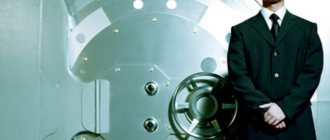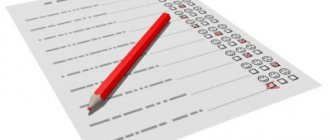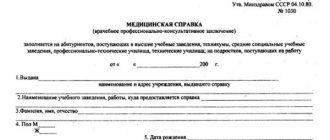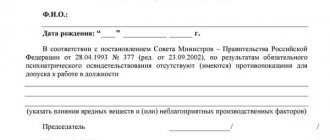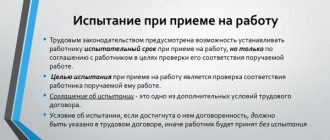Home / Labor Law / Employment / Hiring
Back
Published: 07/04/2016
Reading time: 8 min
0
2411
Labor legislation (Article 86 of the Labor Code of the Russian Federation) allows the employer to collect information about an applicant for a vacant position by any means with his written consent and does not prohibit conducting lie detector tests when hiring.
At the same time, it is strictly prohibited to collect and process information in this way regarding the religious and political preferences of the applicant, as well as his personal life. The law also prohibits asking questions about criminal records, reasons for dismissal from previous jobs, and relationships with management.
It is best to establish the conditions and procedure for taking a polygraph in local regulations, as well as establish an employee consent form. Often they undergo a check after they have already been hired, for example, when trying to identify the culprit in the theft of funds, but this procedure still cannot be carried out without written consent.
- Goals of the procedure
- What professions require passing?
- Who should not be tested?
- Procedure for carrying out the procedure Introductory conversation
- Written agreement
- Installation of sensors
- Setting up the device for a specific person
- The test itself
- Polygram
Polygraph when applying for a job: what is the procedure
Some employers have strict requirements for their potential employees. They consider it necessary to establish not only the level of qualifications of the applicant, but also to check some facts from his life. Information provided by a future employee of the organization can be analyzed using a polygraph.
A polygraph or lie detector is a device with which psychophysiological examinations of the applicant are carried out.
The polygraph records various human parameters:
- cardiovascular activity;
- electrical resistance of the skin;
- breathing rate;
- other physiological parameters.
The obtained measurement results are analyzed, as a result of which the degree of reliability of the information presented is determined. The developers of the technique proceed from the fact that when a person lies, he becomes nervous. Such a reaction is reflected in indicators of the physiological state. Deviations from the state of rest are precisely what the lie detector registers.
Table: types of polygraphs
| Device type | Features of work |
| Analog polygraph | Data recording is carried out on chart paper. |
| Digital polygraph | The recording is made on electronic media using a computer. |
Using a polygraph, the employer determines whether the applicant is suitable for the position for which he wishes to be employed.
The lie detector allows you to calculate the following facts:
- whether the applicant used alcohol and drugs;
- whether he falsified information about himself;
- whether the potential employee has a criminal record;
- whether the applicant took bribes at previous places of work, etc.
A polygraph test implies not only the use of the device, but also the participation of a qualified specialist.
It is the employee performing the inspection that has a greater influence on the quality of the procedure. The device itself only records the results of the study.
It is believed that the polygraph method has a high degree of reliability of 90–96%. However, the cost of such a device is quite high, so not every employer can afford to use it.
Is it legal to take a polygraph when applying for a job?
In our country, the procedure for using a polygraph in the employment of citizens is not regulated at the legislative level. This means that public and private organizations, if desired, can use a similar method to verify the accuracy of the information provided by employees.
The use of a lie detector by an employer does not qualify as a violation of current legislation.
However, there is a Federal Law “On the Use of the Polygraph” dated December 7, 2005, which establishes requirements for the use of such a device and conducting surveys in our country. You can also rely on this document when employing citizens.
Is it legal to use a polygraph as an adjunct to an interview?
The law of the Russian Federation contains no provisions prohibiting the use of the device when applying for a job. But a person cannot be forced to participate in an event. A person undergoes a polygraph solely voluntarily. The applicant for the position must provide his written consent to the procedure. However, in some cases, testing is not recommended. Consider these cases:
- Exhaustion of the person being tested.
- Incapacity.
- Presence of heart or respiratory diseases.
- Temporarily incapacitated due to alcohol or drug use.
- Minority.
- Pregnancy.
What are the conditions for conducting a polygraph test ?
All these cases are limitations in the use of a lie detector. There are no direct prohibitions, but it makes sense to follow these recommendations. This is due to the fact that in the presence of the listed conditions, the polygraph may give incorrect information.
IMPORTANT! Unscrupulous applicants try to avoid taking a lie detector test. Many people know about such contraindications to testing as diseases of the heart or respiratory system. Applicants, not wanting to take a polygraph, refer specifically to these diseases. In order to prevent lies, it makes sense for the employer to request certificates of the actual presence of illness.
ATTENTION! The employer has no right to force the applicant to undergo testing.
What professions are subject to polygraph testing?
Most often, a lie detector examination is resorted to if a potential employee, in the course of his work, will have access to material assets or information that cannot be disclosed.
These employees include:
- trade workers (for example, if they sell jewelry);
- bank employees;
- applicants for positions in the Ministry of Internal Affairs;
- FSB officers.
Banking employees and applicants for the Ministry of Internal Affairs have been subject to lie detector tests since 2013.
Who should not be tested with a polygraph?
According to the law, not all employees can be subjected to a polygraph test.
Such citizens include the following persons:
- pregnant women during the 2nd and 3rd trimester (or in the 1st trimester during ailments);
- persons with a mental disorder or mental retardation;
- children under 14 years of age (citizens from 14 to 18 years of age can be checked only with parental consent);
- persons who are intoxicated or under the influence of narcotic drugs and psychotropic drugs;
- citizens who are physically exhausted or tired, etc.;
- those citizens who have cardiovascular diseases, etc.
A citizen who believes that he cannot be tested with a lie detector must provide documentary evidence (for example, a certificate from a hospital).
Is it possible to prepare for testing?
If the candidate has nothing to hide, then no serious preparations are required from him.
Expert advice is to rest before the interview and avoid any alcoholic products or drugs the day before the interview.
It is not very possible to prepare for the questions themselves, because they vary from case to case, but you can still get acquainted with the “uncomfortable” questions that are sometimes asked on a polygraph and play out a logical, honest and structured answer to them in your head.
Before the interview you should be familiar with the general scope of the questions, please note that questions about sexuality, race and religion cannot be asked.
The most difficult moment will be moral and psychological preparation: a polygraph test is an unpleasant and stressful event, even if a person has nothing to hide. But there is no need to be afraid that the excitement from the procedure itself will be taken as a lie - a good polygraph examiner configures the device in such a way that the initial excitement will be taken as the lower threshold of calm.
Procedure
The polygraph testing procedure consists of several stages:
- At the first stage, the employer receives the potential employee’s written consent to such a procedure (sample document here).
- Then the actions preceding the main process are carried out:
- an introductory conversation is held with the test taker;
- special sensors are installed;
- The polygraph is customized for the person being tested.
- Next is the testing itself.
- Test results are analyzed and brought to the attention of the test subject and the employer.
Written consent to undergo
Due to the fact that polygraph testing is not regulated at the legislative level, the applicant has the right to refuse such a procedure. If a potential employee does not wish to undergo a polygraph test, he must express his refusal in writing.
The application for refusal to undergo a polygraph test may indicate circumstances that impede testing.
Disagreement to undergo the examination procedure does not provide for any consequences for the subject. However, a refusal of employment by the employer may follow.
It is believed that such an employer’s decision can be appealed in court. In fact, rarely does anyone manage to qualify the employer’s actions as an illegal refusal to hire.
Consent is also issued in the form of a statement.
In the application for voluntary consent to conduct a polygraph test, the applicant must confirm that no methods of pressure were used against him
Introductory conversation
The conversation before the polygraph test is an important stage of testing. The effectiveness of the research depends on it.
The procedure is carried out only in the presence of a specialist called a polygraph examiner.
During the introductory conversation, the following happens:
- the polygraph examiner explains the essence of the study;
- establishing contact with a potential employee;
- circumstances that may affect the testing procedure are clarified;
- The test taker is instructed.
The briefing contains the following rules:
- All questions should be answered quickly and only “yes” and “no”.
- During the test, only the answers to the questions are announced by the applicant.
- You must not move during the test.
- Breathing should occur in a natural rhythm.
- You can't close your eyes for a long time.
- Legs should be relaxed.
- During the test, the subject must look in front of him.
- The applicant must remember that the same questions are asked several times.
- If the applicant did not understand or did not hear the question, as well as if he was thinking about something extraneous, he should remain silent.
- The person being tested should remember that the order of the questions may change.
Installation of sensors
As a rule, a laptop computer with a sensor unit to which sensors are connected is used to carry out the procedure.
The unit registers parameters and converts signals into digital codes, which are then entered into the computer.
Next, the sensors are attached to the test subject:
- Electrical conductivity sensors and a pulse rate meter are installed on the fingers (only on one finger);
- on the chest and stomach - breathing sensors.
Setting up the device for a specific person
First, the applicant for a position is asked questions with obviously obvious answers to identify the physiological reaction to truth and lies. In this way, the polygraph is calibrated for the person being tested.
Typically the following questions are asked:
- full name of the applicant;
- date and place of his birth;
- names of family members;
- previous place of work, etc.
After setting up the device for the test subject, the main testing begins.
Examples of questions for polygraph testing
The questionnaire is compiled individually and depends on the specific position.
Rules for asking questions during a polygraph test:
- questions should exclude double interpretation;
- all words must be understandable to the test taker;
- the keywords are at the end (“Did you steal money from the safe?”);
- the phrase should be short.
Typically the test contains no more than twenty questions.
Let's look at common questions:
- information included in the resume;
- information provided by the applicant about himself;
- history of theft;
- contacts with competing companies;
- presence of bad habits;
- having a criminal record;
- presence of debts to credit institutions;
- compliance of the applicant’s skills with the position;
- level of interest in work;
- negative intentions regarding the organization, etc.
The testing procedure lasts from 40 to 120 minutes.
Test results
Within three days after the polygraph test, a polygraph examiner contacts the subject and makes an appointment to announce the results to him. The result of passing the test is a written conclusion and a polygraph record, i.e. a polygram.
A polygram is a graphic display of the results of a polygraph test
A sample conclusion looks like this.
The conclusion about passing a polygraph test describes in detail the entire examination process.
The results of the inspection are prohibited from being disclosed to third parties.
Lie detector test procedure
Before starting, the polygraph examiner gives detailed instructions to the subject and connects the sensors. A candidate screening session lasts several hours. If the expert suspects the subject of trying to deceive the device, it may drag on even longer.
How to pass a lie detector
It should be remembered that without your consent no one has the right to force you to take a polygraph. It doesn’t matter in what situation such a need arose. You must first be asked to sign a consent form. If you are unsure of your abilities, it is better to refuse immediately.
When preparing for a lie detector test, you should take into account the advice of a polygraph examiner:
- sleep well;
- Do not be scared;
- follow instructions;
- answer questions clearly and specifically.
And a few more tips from a polygraph examiner:
- It is necessary to take a comfortable position without unnecessary tension . Warn immediately if any factors cause discomfort. Movements during the session should be minimal.
- In order to pass the polygraph correctly, do not rush to answer the question until you have listened to it to the end and understood the meaning . But don’t think too long.
- Don't delve too deeply into your memories . If, when asked about theft, you go through the events of your childhood, when you borrowed a shovel from a neighbor in the sandbox without permission or mistakenly took a pen home from work, nothing good will come of it.
- Do not interrupt the polygraph examiner or argue with him . Do not try to evaluate how the specialist reacts to your words, whether he believes them. Don't ask him questions. It is especially not worth clarifying whether the polygraph can make a mistake. This question calls into question the importance and professionalism of the polygraph examiner. Automatically causes negative emotions towards you.
- Behave confidently and kindly . It is the polygraph examiner who will interpret the results. If he has a favorable impression of you, it will likely have a positive effect on his lie detector report.
How to fool a polygraph
If you still have something to hide, some techniques can help you not give yourself away. Although they are not easy to apply.
First of all, you should overcome your fear of the procedure. This will make it much easier to control responses, emotions and body indicators.
From the very first question you should provoke non-standard reactions in yourself. This effect can be achieved thanks to:
- pain (pinches, scratches, button injections);
- sedatives;
- feeling tired or drowsy;
- emotional thoughts;
- bladder fullness.
Thus, the fluctuations in physiological reactions when answering obvious questions will be quite high. They will be accepted as the norm. Bursts when answering significant questions will not seem so contrasting.
As noted above, the lie detector does not react to the lie itself, but to your reaction. Believe what you say. If a person is absolutely convinced of the truth of his words, anxiety is minimal. It is not for nothing that they believe that the best people to fool a lie detector are actors and pathological liars.
Think through your story in advance, all the subtleties and details, motives. Rehearse the lie detector test with someone close to you. Preferably several times. Let your assistant evaluate how natural and harmonious the answers to compromising questions sound.
Control of physiological reactions
There are several techniques that will allow you to control physiological reactions:
- Your palms will sweat less when answering uncomfortable questions if you pre-treat them with a special ointment based on salicylic acid or alcohol. You can find the product at any pharmacy. First, you should test it. The smell may give you away.
- We must not forget about the frequency of inhalation and exhalation. This is one of the physiological indicators that you can learn to control. However, it takes training.
- Another method is to focus on a neutral object. Let your thoughts be occupied by some picture with a neutral subject, for example, a still life with fruit. When answering all questions, think about what is shown on it, what the frame looks like. This will reduce emotionality.
- The question substitution method works in a similar way. Mentally change the polygraph examiner’s question and answer it.
- Alcohol, sedatives, sedatives, drugs for lowering and increasing blood pressure will certainly complicate the work of the lie detector. The main thing is not to overdo it. This may negatively affect your health or cause suspicion.
How to pass a polygraph when applying for a job: tips for job seekers
As a rule, the need to take a polygraph test frightens applicants. If a person does not hide a criminal past, that is, he is clean before the law, he should not be afraid of verification.
The emotional state will not affect the result, since specialists will set up the device as necessary.
Advice to applicants will be as follows:
- you need to get enough sleep the night before the procedure;
- do not drink alcohol, drugs or sedatives;
- the test taker must calm down and mentally tune in to the test;
- the potential employee must answer honestly;
- You shouldn’t analyze the questions, but say the first thing that comes to mind, etc.
Recommendations for the applicant
The applicant is advised to prepare for the test. The following recommendations exist:
- The procedure will require patience and concentration. Before passing it, it is recommended to get a good night's sleep and rest.
- Let's take light sedatives. This is necessary due to the fact that a polygraph test is a rather nerve-wracking event.
- A person must understand that he can refuse to answer a question at any time. However, it must be borne in mind that such behavior may be interpreted not in favor of the applicant.
FOR YOUR INFORMATION! The polygraph does not give 100% accurate results. For this reason, the test results are not used in court as evidence, but they may be attached to the case. The employer also needs to keep in mind that refusal to undergo testing does not always mean that the applicant is lying.
Is it possible to fool a polygraph?
On the Internet you can find recommendations that supposedly should help in hiding personal information during a lie detector test. However, you should not resort to such advice, since they boil down to ensuring that the person violates the rules of taking a polygraph. For example, the subject must neglect sleep or take any medications before the test.
It is worth remembering that it is very difficult to deceive a polygraph, since the indicators being examined usually give away the person being tested.
Only specially trained people, for example, intelligence officers, can handle a polygraph.
NOTIFICATION
Be sure to check the date, office and time of testing - see contacts
. Study the contacts yourself for a description of how to get to the office, because The expert may be busy checking and will not be able to advise you on how to get there.
Notice content:
- General information;
- Recommended;
- Duration of the study;
- Cloth;
- Prohibited 24 hours before the test;
- How will the polygraph test be conducted?
- Guarantees;
- Important;
- Test topics.




